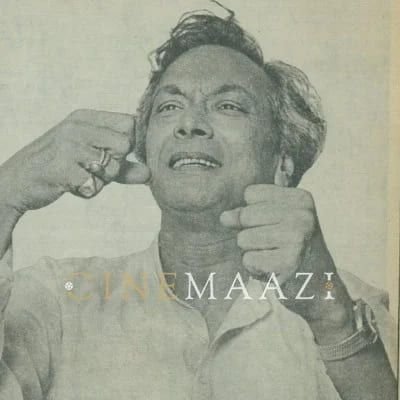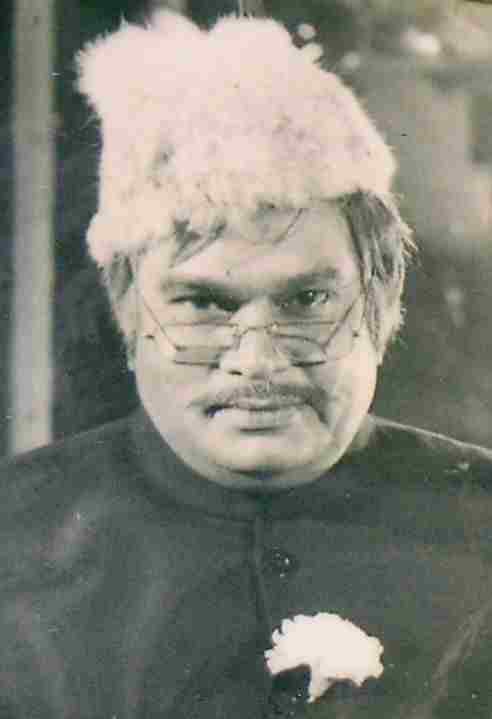Maajhi Naiya Dhoondhe Kinara – Yunus Parvez
23 Mar, 2020 | Beete Hue Din by Shishir Krishna Sharma
Subscribe to read full article
This section is for paid subscribers only. Our subscription is only $37/- for one full year.
You get unlimited access to all paid section and features on the website with this subscription.
Not ready for a full subscription?
You can access this article for $2, and have it saved to your account for one year.
Cinema has had a relationship with theatre from its infancy. In particular, the foundation of the talkies was based on theatres. Many masters of yesteryears like Master Nisaar, Jahanara Kajjan, Sohrab Modi, Prithviraj Kapoor, Balraj Sahni, A K Hangal, Sanjeev Kumar to other numerous actors-actresses like Naseeruddin Shah, Om Puri, Shabana Azmi, Amol Palekar and today’s Nawazuddin Siddiqui and Radhika Apte have all entered films from the theatre world and made a name for themselves. One such artist was character actor Yunus Parvez who was a familiar face in Hindi cinema for over three decades from 1970s to 1990s. In stark contrast to his screen image, Yunus Parvez was a highly educated and extremely intelligent personality who was also active for a short period in the field of politics. I met him in the middle of February 2004 at his residence in Mumbai’s western suburb, Mira Road’s Naya Nagar area. His house, incidentally, happened to be situated at a mere one and a half kilometer from my own residence. During this interview, taken for my column Kya Bhooloon Kya Yaad Karoon for Sahara Samay weekly, he talked at length about his personal and professional life.
“At Allahabad university I got the opportunity to learn from noted educationists like Dr Harivansh Rai Bachchan, Dr Raahi Masoom Raza and Firaaq Gorakhpuri. During this period, I also got associated with theatre and parallel to my acquiring the BA and MA degrees in Urdu, I started participating whole heartedly in the college plays.”
Belonging to Uttar Pradesh’s Ghazipur area, Yunus Parvez was born on 8 October 1931 in Mirzapur. His father worked for the police force. Due to his father’s frequent transfers every two to three years, Yunus Parvez completed his school education from many towns and cities of East Uttar Pradesh after which he came down to Allahabad for his higher studies. During our conversation, he told me, “At Allahabad university I got the opportunity to learn from noted educationists like Dr Harivansh Rai Bachchan, Dr Raahi Masoom Raza and Firaaq Gorakhpuri. During this period, I also got associated with theatre and parallel to my acquiring the BA and MA degrees in Urdu, I started participating whole heartedly in the college plays.”
"After completing my MA, I started preparing for my PhD. At that time, I went to Delhi for a few days to meet famous actor Dewan Virendranath. Dewan Virendranath was the paternal uncle of actor Kabir Bedi. One evening, Virendranath ji took me to Russian embassy for a party where I got introduced to famous theatre personalities Begum Qudsia Zaidi, Habib Tanvir, Mime Artist Irshad Panjtan and Writer-poet Niaz Haider. I had won Utttar Pradesh’s Best Actor award the same year..."
Yunus Parvez while representing his college in university’s ‘Intercity Youth Festival’ won the prestigious ‘Best Actor’ award for three consecutive years. His photos and interviews were published in the newspapers regularly due to which he became well known as a theatre enthusiast. He told us, “After completing my MA, I started preparing for my PhD. At that time, I went to Delhi for a few days to meet famous actor Dewan Virendranath. Dewan Virendranath was the paternal uncle of actor Kabir Bedi. One evening, Virendranath ji took me to Russian embassy for a party where I got introduced to famous theatre personalities Begum Qudsia Zaidi, Habib Tanvir, Mime Artist Irshad Panjtan and Writer-poet Niaz Haider. I had won Utttar Pradesh’s Best Actor award the same year and they were all already familiar with my work. On their suggestion I dropped my idea of pursuing a PhD and joined Begum Qudsia Zaidi’s ‘Hindustani Theatre’. This incident took place in 1959.”
He recalled, “Top politicians like Pt Nehru, Dr Zakir Hussain, Krishna Menon and S K Patil used to often visit to see our preparations for various plays. After the successful screening of a play there used to be a party organized at the Prime Minister’s house. On one occasion, the then president, Dr Rajendra Prasad had even kept the screening of our play ‘Shakuntala’ in honour of Egypt’s President Nasser.”
The foundation of ‘Hindustani Theatre’ was laid by the inspiration of Pt Jawaharlal Nehru and it received government support regularly. Yunus Parvez was associated with ‘Hindustani Theatre’ for a period of nearly four years. Under the theatre’s banner he worked for many plays along with noted theatre artists like Habib Tanvir, M S Sathyu and Narendra Sharma. He recalls,“Top politicians like Pt Nehru, Dr Zakir Hussain, Krishna Menon and S K Patil used to often visit to see our preparations for various plays. After the successful screening of a play there used to be a party organized at the Prime Minister’s house. On one occasion, the then president, Dr Rajendra Prasad had even kept the screening of our play ‘Shakuntala’ in honour of Egypt’s President Nasser.”
‘Hindustani Theatre’ was at its pinnacle when the demise of Begum Qudsia Zaidi at the age of just 44 years of cardiac arrest occurred. On the other hand, as a result of the Sino-India war, the focus of Pt Nehru and the whole government apparatus had shifted away from ‘Hindustani Theatre’. As a result, ‘Hindustani Theatre’ lost its glory. In such a situation, like many of his co-artists, Yunus Parvez also came to Mumbai to try his luck around 1964. In Mumbai, Yunus Parvez became a member of IPTA and became active in theatre again along with stalwarts like Khwaja Ahmed Abbas, Sagar Sarhadi, Balraj Sahni and Ramesh Talwar.
‘Hindustani Theatre’ was at its pinnacle when the demise of Begum Qudsia Zaidi at the age of just 44 years of cardiac arrest occurred. On the other hand, as a result of the Sino-India war, the focus of Pt Nehru and the whole government apparatus had shifted away from ‘Hindustani Theatre’. As a result, ‘Hindustani Theatre’ lost its glory. In such a situation, like many of his co-artists, Yunus Parvez also came to Mumbai to try his luck around 1964. In Mumbai, Yunus Parvez became a member of IPTA and became active in theatre again along with stalwarts like Khwaja Ahmed Abbas, Sagar Sarhadi, Balraj Sahni and Ramesh Talwar.
Yunus Parvez recalled, “My debut film was the 1968 release, Haseena Maan Jaayegi after which I got the role of Maajhi in Rajshree Production’s 1971 film Uphaar. Its superhit song ‘Maajhi Naiya Dhoondhe Kinara’ was picturized on me."
Yunus Parvez recalled, “My debut film was the 1968 release, Haseena Maan Jaayegi after which I got the role of Maajhi in Rajshree Production’s 1971 film Uphaar. Its superhit song ‘Maajhi Naiya Dhoondhe Kinara’ was picturized on me. My struggle was continuing. I worked in a few films in small roles. Then I did the role of an opportunist political leader in the well-received film Garm Hawa in 1973. This film, on one hand gave me recognition above the masses and on the other hand fetched me a felicitation from the U.P. Journalist Association. My recognition among the masses however came with the 1975 release Deewaar. My character of Raheem Chacha in the movie was appreciated a lot by the audience. After the stupendous success of the film Deewar (1975), I became quite busy.”
During the period 1975 to 1995, Yunus Parvez’a career was at its peak. He acted in nearly 350 films including almost all Amitabh Bachchan films, B.R. film’s Nikaah (1982), The Burning Train (1980), Insaaf Ka Taraazu (1980), Awaam (1987), Dehleez (1986) and also Zakhmi(1975), Aalaap (1977), Asha (1980), Avtar (1983), Umrao Jaan (1981), Golmaal (1979), Maang Bharo Saajna (1980), Baazaar (1982),Laila (1984), Tridev (1989), Mohra (1994), Jaal (1986) and ABCL company’s Tere Mere Sapne (1996). The 2005 release Bunty Aur Babli and 2007’s Bhojpuri Film, Baanke Bihaari M.L.A. were among his last released films.
During the period 1975 to 1995, Yunus Parvez’a career was at its peak. He acted in nearly 350 films including almost all Amitabh Bachchan films, B.R. film’s Nikaah (1982), The Burning Train (1980), Insaaf Ka Taraazu (1980), Awaam (1987), Dehleez (1986) and also Zakhmi(1975), Aalaap (1977), Asha (1980), Avtar (1983), Umrao Jaan (1981), Golmaal (1979), Maang Bharo Saajna (1980), Baazaar (1982),Laila (1984), Tridev (1989), Mohra (1994), Jaal (1986) and ABCL company’s Tere Mere Sapne (1996). The 2005 release Bunty Aur Babli and 2007’s Bhojpuri Film, Baanke Bihaari M.L.A. were among his last released films.
“In the year 1984, Sunil Dutt fought his first election. Having entered active politics, he invited me too and I took the membership of Congress. But due to some special reasons, I was forced to leave Congress to join Samajwadi Party. "
Yunus Parvez also had a deep interest in politics in addition to Acting. He was active in politics during his college days as well. He told us, “In the year 1984, Sunil Dutt fought his first election. Having entered active politics, he invited me too and I took the membership of Congress. But due to some special reasons, I was forced to leave Congress to join Samajwadi Party. I even fought the 1998 Lok Sabha Elections on their ticket after which I returned back to Congress. My family consists of my wife, one son and three daughters. My son Arshad Khan is a film director while all my daughters are well settled after marriage.”
Yunus Parvez passed away at his Mira Road residence at the age of 71 on 11 February 2007 due to complications arising out of his uncontrolled diabetes.
[Part of Shishir Krishna Sharma's Beete Hue Din blog series]
Yunus Parvez passed away at his Mira Road residence at the age of 71 on 11 February 2007 due to complications arising out of his uncontrolled diabetes.
[Part of Shishir Krishna Sharma's Beete Hue Din blog series]
121 views








.jpg)



